 By Pepper Parr By Pepper Parr
January 1st, 2021
BURLINGTON, ON
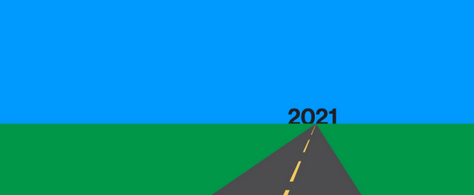
It is going to be a tough year.
It will be a long haul.
There is of course much hope but there is also a lot to think about.
The way we have failed to take care of those seniors who live in long term care facilities is shameful. The lady in my life said this morning that it must be terrible for an older person who “has all their marbles” to sit in their room realizing that there aren’t enough people to really take care of them.
Lurking behind this is the fact that demographically there is a huge wave of people who will find themselves in long term care facilities who should be asking if they are going to be taken care of.
The look of their “sunset years” has been painted out for them – it is not a pretty picture.
The vaccines are now being produced and people are being vaccinated – why there isn’t more assurance as to when the needle will be put in their arm is disturbing.
The eve of the New Year has traditionally been a time to celebrate and look forward to great things ahead.
This year our thoughts may well be asking how we are going to get through what we are experiencing and perhaps looking more closely at our core values.
Reading that the Ontario Minister of Finance slipped out of the country to enjoy a vacation and basically lied to the public about where he was, and the Premier seems to have covered for him, points out just how big the divide is between the haves and the have-nots.
Rod Phillips is the Minister who is responsible for the Ontario Jobs and Recovery Committee – the one that is going to get the provincial economy back on track; his ‘follows his own rules’ attitude doesn’t leave us with a surge of confidence.
There are more questions than answers at this point. The challenge for us is to find the core values that make us the people we are and then to ensure that they prevail.

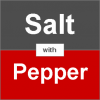 By Pepper Parr By Pepper Parr
December 31st, 2020
BURLINGTON, ON
I am sure the ethical frame work, released by the province yesterday, within which the distribution of vaccines will be distributed is important.
Did the public not expect that there would be one in place? This is not what the public wanted to know. People want to know when they will be getting their vaccinations.
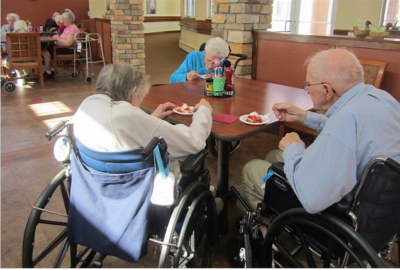 Are the long term care residents first? People understand that the people working the front lines in the hospitals and those in long term care facilities are high, very high on the list.
I would not want to be the one who had to choose which came first.
It is after those two groups that the vast majority of the public fall into.
When does the 90 year old in good heath get vaccinated?
And where will she go for that vaccination?
We read that there is a shortage of nurses who will do the inoculation and that the people making the decisions are calling in retired nurses and students.
We are just doing that NOW? That is work that should have been done months ago.
There is no rocket science in this. We have population data and we know how many people can be vaccinated in an hour. Do the math.
 Where are the young people on the schedule ? The public understands that it takes time to set things up – the bureaucrats and the medical community have had the time to get this work – March, April, May, June and July – when they knew there was going to be a second wave, and when it was becoming clear that a vaccine was going to be available.
Being told that the Ontario government has released an Ethical Framework for COVID-19 vaccine distribution which was developed in partnership with the COVID-19 Vaccine Distribution Task Force to guide further vaccine prioritization and distribution across the province doesn’t quite cut it in terms of keeping a public informed.
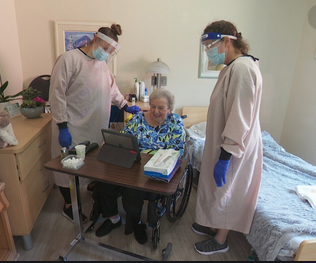 Where are the front line workers on the inoculation schedule; the people at risk working for not much more than the minimum wage. “This ethical framework is a clear demonstration of our commitment to Ontarians to be transparent,” said General Rick Hillier (retired), Chair of the COVID-19 Vaccine Distribution Task Force. “We know that people are eager to get vaccinated and this framework helps ensure that we do it in an ethical, effective and compassionate way.”
“Phase One of Ontario’s three-phase vaccine implementation plan began on December 15, 2020 at two hospital sites, and increased to 17 additional sites the following week, with the delivery of 90,000 Pfizer-BioNTech doses. With Health Canada’s recent approval of Moderna’s COVID-19 vaccine, the province can expect about 50,000 additional doses before the end of the month.”
Couple of questions: How many phases are there going to be and what are the dimensions of each phase ?
The people leading the program to get us all vaccinated as quickly as possible are not generating much in the way of public confidence.
We can do better than this. And we should be doing better than this.
Salt with Pepper is the musings, reflections and opinions of the publisher of the Burlington Gazette, an online newspaper that was formed in 2010 and is a member of the National Newsmedia Council.

 By Ray Rivers By Ray Rivers
December 30th, 2020
BURLINGTON, ON
Premier Ford started an online petition to persuade the federal government to enhance border control, presumably to tighten quarantine and restrict flights from COVID hotspots. It may be a little unorthodox for a province to start a public petition, but he must have felt it was necessary.
Our federal government has a less than stellar history when it comes to border control. Failure to act earlier by closing the border and enforcing quarantine was responsible for bringing the virus into our communities in the first place.
But today most of the infection comes via community transmission. Alberta has a pilot program in place to either test or quarantine arriving passengers at its airports. Their records show that less than 2% of all arrivals are testing as positive. Of course, if all arrivals properly quarantined none of this should be a problem. But we know people cheat, even in New Zealand and Australia where the military confines arriving passengers into mandatory quarantine in dedicated hotels.
So bravo Mr. Ford. But before Ford goes all ballistic and accuses the federal government of sloppy border control, he should look in his own backyard. Ontario’s winter surge of COVID cases is almost entirely the result of half-hearted provincial policies. Having declared victory too early, last summer, Ford’s administration has now allowed the virus to spread even further into workplaces, grocery stores and gradually into schools.
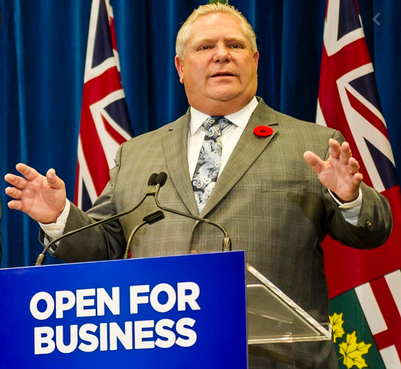 That lifting of the lock-down in March was probably not the Premier’s best decision. Ford’s enthusiasm in reopening the economy, pretending Ontario was back to some kind of near-normal was folly. Opening bars and restaurants, gyms and churches and expanding the allowed size of private gatherings have all contributed to the degree of sickness we now find.
The mixed messages and ever changing rules of the government’s COVID public health restrictions were proof that the authorities had no plan, were making it up on the run or just muddling through. And then there is the unfortunate hypocrisy, as for example, when one of the government’s senior ministers holidays in the Caribbean while the Premier lectures the rest of us to stay at home.
If Ford actually had a plan it would be ‘waiting for a miracle’ – the vaccine. And even with that his people have fumbled at getting it out of the starting gate. Ontario has the lowest rate of inoculations among all provinces. And stopping inoculations over the holiday period, as if waiting for Santa to return to the North Pole, has not helped the government’s credibility. Not that COVID ever takes a break!
Ford’s effort to restart the economy too early has set this province back, rather than move us ahead. It has turned out to be a short term gain for a much longer and more severe pain. He is fortunate that the federal government has been shouldering the vast majority of the costs of this pandemic. But we know there is only one taxpayer in this federation at the end of the day.
Sadly there is some question as to whether the vaccines will even stop the epidemic or just keep us from getting sick. A scientist at the World Health Organization (WHO) has speculated that the virus may continue unabated to spread and mutate, perhaps to a variant which can evade the vaccine we’ve just taken and/or become even more deadly as happened with the Spanish Flu.
 The Teddy Bear makes it all bearable. While we are waiting for our jab in the arm, shouldn’t our biggest effort be to eliminate the virus to (near) zero, the hard and proven way, as New Zealand and even China have done?
The truth is we really don’t know what these vaccines will accomplish, for how long they will protect and even whether there will be longer term undesirable consequences for those immunized. But assuming they do work as hoped, at current roll-out rates it may take close to a year to immunize enough people to allow us to safely get back to some kind of normal. By contrast New Zealand eliminated its viral contagion in seven weeks with an extensive and enforced stay-at-home lock down.
Mr. Ford’s current partial lockdown for 28 days, given the extent of infection transmission, particularly in the workplace, is not likely going to be enough. All of these half-hearted solutions have only led to COVID fatigue and rule breaking and ultimately to some kind of mental health crisis. And the task is not hopeless. Atlantic Canada has shown how it is possible to manage a contagion while the rest of the provinces have floundered.
In hindsight perhaps controlling this epidemic was too big a job to be left in the hands of the provincial governments and their health authorities. Perhaps the Prime Minister should have enacted the Emergency Act as he had offered to do at the outset of the crisis. After all, the feds are picking up the tab while we lock down and they could hardly have done a worse job with the miserable series of lock-downs. But then Mr. Ford might reasonably point out that the feds needed to have got their own house in order first – and he’d point to border control.
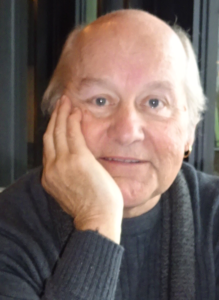 Ray Rivers writes from time to time about whatever is on his mind. A former sheep farmer he has served as a federal bureaucrat for 25 years, ran for public office and lost. He was the founder of the first sustainability public interest group in Burlington. Ray Rivers writes from time to time about whatever is on his mind. A former sheep farmer he has served as a federal bureaucrat for 25 years, ran for public office and lost. He was the founder of the first sustainability public interest group in Burlington.
Background links:
Ford’s Petition – Ontario Vaccinations – Acting Early –
Ontario Mess – Not Prepared – Ontario Minister Holiday –
WHO Scientist Doubts – Alberta Airport Arrivals –

 By Pepper Parr By Pepper Parr
December 30th, 2020
BURLINGTON, ON
OPINION
An Ontario politician who has already been charged once for disobeying COVID-19 rules is blatantly breaking them again.
MPP Randy Hillier posted a photo on Twitter Sunday showing himself and 14 other people at what appears to be a holiday celebration. He used the hashtag “#nomorelockdowns” to accompany the photo, which shows disregard for Ontario’s public health guidelines.
In another tweet, he confirmed the photo was taken Dec. 27.
Ontario has been in a province wide lockdown since Dec. 26, put in place to combat the rapid spread of the novel coronavirus and ease the strain on the province’s health-care system.
Announcing the lockdown last week, Premier Doug Ford said it was a necessary measure to save hospitals from becoming overwhelmed in upcoming weeks. Currently, no indoor social gatherings are allowed, except for those with members of the same household.
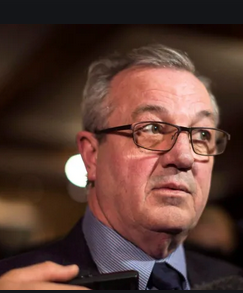 Randy Hillier, MPP for an Eastern Ontario riding had been expelled from the Tory Caucus, is still pushing back over the Covid rules. Ontarians found guilty of hosting illegal private gatherings can face a fine ranging from $10,000 to $100,000, according to the Reopening Ontario Act.
In November, Hillier said on Twitter he was charged for his role organizing a large gathering at Queen’s Park in Toronto. He has opposed lockdowns and masks and has promoted a debunked pandemic conspiracy theory in the Ontario legislature.
Ford previously called the MPP “totally irresponsible” for the protest. The premier said he’s “never figured out” anti-maskers who believe COVID-19 is a hoax, saying, “this is a very serious virus we’re seeing … around the world, around our country.”
People on Twitter have called for Hillier to resign.
This comes after more than 40 local physicians signed an open letter to Hillier in December, fact-checking his incorrect claims about COVID-19.
“You are spreading misinformation that minimizes the seriousness of COVID-19 to support your personal anti- lockdown and anti-mask beliefs,” Dr. Jeanette Dietrich wrote.
“I urge the public to ignore you and heed the advice of trained health care professionals. Continue to practice social distancing, wear masks, and keep everyone safe.”
The above was picked up from Huffington Post Canada.
 Described as The Island for Billionaires St. Barts was the holiday destination for the province’s Minister of Finance while the rest of Ontario is under a month long lock down. It gets worse. We learned today that the Ontario Minister of Finance, Rob Phillips, had slipped out of the country early in December to the Caribbean island of St. Barts to celebrate the holidays in the sunny, sunny south.
Premier Ford, said he was not aware the Minister had left the county and ordered him to return immediately.
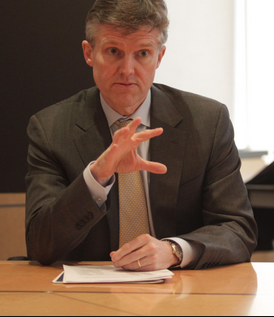 Rod Phillips, was once the Minister of the Environment and moved into Finance. He was at one time the Chair of Post Media. His is going to have to get some media help to get out the mess he is in now. The Minister did leave for his holiday, which had been planned sometime before the lock down was put in place.
While out of the country his staff was sending out tweets which implied that he was still in the country serving the public.
An example of really sick hypocrisy.
Durham Region, where Phillips’ constituency is located, entered into the “control” phase of Ontario’s tiered lockdown system in late November. Public health guidance for this phase says trips outside of the home “should only be for essential reasons.”
Tweets from Phillips’ official Twitter account reminded Ontarians on Christmas Eve to thank the “special heroes” making sacrifices during the pandemic.
“As we all make sacrifices this #Christmas, remember that some of our fellow citizens won’t even be home for Christmas dinner over Zoom,” the tweet reads.
“Thousands of front line heroes will be at work, looking out for us.”
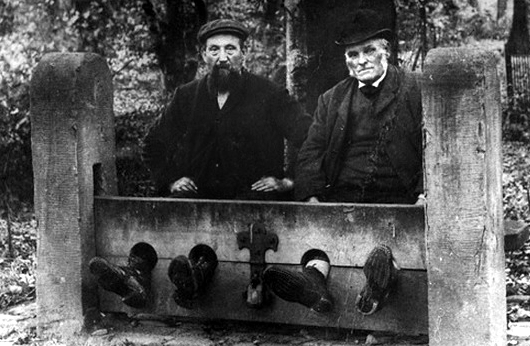 There was a time when Stocks were set up in public places where offenders against public morality formerly sat imprisoned, with their legs held fast beneath a heavy wooden yoke. It was never outlawed – just fell out of favour. Might be time to bring it back Several photos of Phillips on public visits to small businesses and fundraisers were taken before his trip and were tweeted while he was abroad.
The only thing we haven’t heard from the Minister are the words “Let them eat cake”.
The Premier should think in terms of firing Phillips.
Dozens, perhaps hundreds of young people have had to cancel wedding plans because of the 10 person limit lock down requirement for gatherings of people.
With hundreds dying from Covid there are literally thousands who will not be able to attend funerals for the departed.
What I am looking for is a word stronger than ‘hypocrisy’. Putting Phillips in stocks on the lawn outside the Legislature might be an appropriate punishment.
The bigger damage is to the concept of public service which used to be something that was seen as noble. The giving of one’s self to serve the public, which is certainly what those thousands of hospital workers who care for those with COVID-19 are doing, gets trashed by people like Phillips.
Salt with Pepper is the musings, reflections and opinions of the publisher of the Burlington Gazette, an online newspaper that was formed in 2010 and is a member of the National Newsmedia Council.

 By Pepper Parr By Pepper Parr
December 21st, 2020
BURLINGTON, ON
OPINION
We are all in this together.
Is there a member of council who hasn’t used this phrase?
Perhaps Councillor Sharman.
A Gazette reader sent in a comment which we have edited for length and clarity.
His concern was what a tax increase next budget might look like. His view was that a 0% increase was necessary because there are hundreds, perhaps thousands who are not working because their jobs disappeared or because they have been infected with the Covid19 virus.
“ I think we have entered a new reality. The costs of this pandemic have overwhelmingly and been shouldered by the private sector–layoffs, reduced wages, business closures and bankruptcies, increased private debt.
Governments and their employees have largely been sheltered from the worst economic impacts of this pandemic; even before the pandemic, public sector workers were enjoying higher wages, benefits, and pensions than their private sector counterparts. In this environment, governments have no moral authority to go to workers in the private sector and raise their taxes further depressing their standard of living in order to maintain the incomes and benefits of workers in the public sector.
“It is clearly time for governments of all stripes, including the current free spenders on Brant Street, to start reducing their spending …”.
What about a 10% pay cut for the members of Council – the savings would be put into a fund that would be available to those retailers in the city who are taking it in the ear,
The 10% would apply to just the salary – not the gold plated pension or the benefits.
When compared to the council members in the other three Halton municipalities Burlington Councillors have a very sweet deal.
A 10% piece of the base salary would amount to $5000 each. We are talking about just the city salary – our Councillor are also Regional Councillors and the source of the other half of their $100,000 a year pay cheque.
Such a gesture might restore some of the moral authority our reader thinks this council no longer has.
Can this be done – it wouldn’t be easy but it could be done. There was a time when Marianne Meed Ward didn’t think free parking was a benefit she could accept and said she would return the value of that benefit to the city.
Not certain if the Meed Ward followed through on that every year she was a Council member.
Salt with Pepper is the musings, reflections and opinions of the publisher of the Burlington Gazette, an online newspaper that was formed in 2010 and is a member of the National Newsmedia Council.

 By Pepper Parr By Pepper Parr
December 18th, 2020
BURLINGTON, ON
Mayor said ” she has been in close contact with police and has a security plan.”
A little over-reaction perhaps?
The Gazette published an article yesterday about a group that announced it plans to do a citizen’s arrest as their way of protesting over the wearing of facial masks.
The group, Stand4THEE, created a web site, a Face Book page and an Instagram page. Any nutcases can do the same thing.
The group did say in a note to the Gazette that a citizen arrest does not necessarily mean taking a person into custody. Their comment read: “It also should be noted that in order to exercise a citizen’s arrest, as per Bill C-26, the person being arrested does not need to be present.”
They might want to let the police know that.
Misguided? Most certainly. Perhaps we should have ignored them.
Was this important enough to call in the police? Does the Mayor think she is really at personal risk? Will we see a police officer in full SWAT level gear walking beside the Mayor for the next few days?
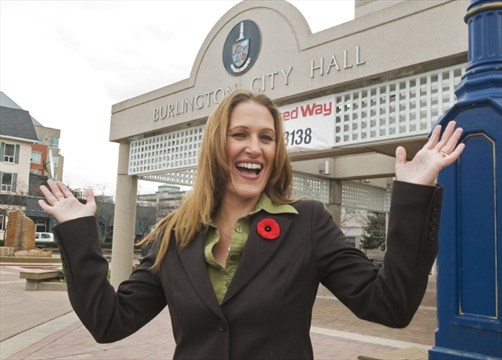 Mayor Meed Ward can usually be found at City Hall. The mayor of Burlington says “she, and police, are taking precautions prior to a protest planned for Friday”, in which members of an anti-mask group claim they are attempting to place her under citizen’s arrest.
Mayor Marianne Meed Ward said she has been in close contact with police and has a security plan.
The CBC reports that the Mayor said: “I’ve taken appropriate measures to make sure that my safety is protected.”
She said police have told her there is “no reasonable grounds” for what the group is trying to do.
She said she supports people’s right to protest, and believes the group members will not attempt to use physical force based on their social media statements.
Salt with Pepper is the musings, reflections and opinions of the publisher of the Burlington Gazette, an online newspaper that was formed in 2010 and is a member of the National Newsmedia Council.


 By Pepper Parr By Pepper Parr
December 16th, 2020
BURLINGTON, ON
OPINION
The leading edge of the second wave of Covid19 infections has hit.
2275 new cases in Ontario yesterday.
Hospitals advised to set aside 15% of their beds for Covid cases and we are still not in a total lock-down phase.
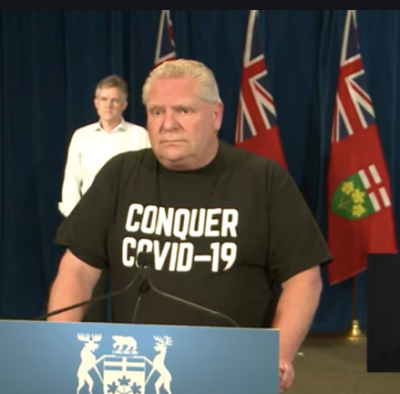 Premier Doug Ford at one of his many media events. The Premier of the province has just not been able to fully understand what it is he has to deal with.
His focus is on the pain the private sector will have to cope with were he to shut everything down.
He understands how the world of business works, the Tories see the world that way.
This is no longer about business – this is about survival and being responsible.
The Premier has said again and again he doesn’t want the damage from the virus to land on the backs of the hard working Canadians who have put everything they have into the businesses they operate.
There are thousands of people who have not survived the virus. They died.
There will be many commercial organizations that will not survive.
Those are hard facts we have to accept
A public opinion survey done by the Leger and the Association for Canadian Studies reports that majority of Canadians support a lock down; 65% of the respondents would like to see everything shut down except for the essentials – drinking a beer in a public place is not essential – if it is there are support groups that can help you.
The vaccine that everyone has been waiting for is now available. It will take some time to get it into the arms of everyone. We each have to wait until it is our turn to roll up our sleeves.
We will get through this.
In order to actually get through this – everything has to be shut down.
Salt with Pepper is the musings, reflections and opinions of the publisher of the Burlington Gazette, an online newspaper that was formed in 2010 and is a member of the National Newsmedia Council.

“Speaking with reporters during a regular briefing at city hall on Wednesday, [Toronto] Medical Officer of Health Dr. Eileen de Villa said that the recent increase in cases is a “concern” but is not altogether surprising in the context of the broader reopening of the economy.” (Chris Fox, CP24.com, August 26, 2020)
 By Ray Rivers By Ray Rivers
December 14th, 2020
BURLINGTON, ON
When I mention New Zealand’s success in eliminating COVID I am immediately lectured about it being a little island in the Pacific with a relatively small population. Canada may border the USA but we enacted essentially the same border restrictions as New Zealand. And as for being small, New Zealand’s population density is almost four times that of Canada and greater than Ontario’s.
 Did Ontario miss a chance to do what New Zealand did. No one over there has to wear a mask. Today New Zealand and its sister island in the Pacific, Australia, have eliminated COVID almost entirely. That means no transmission and no more deaths. In New Zealand it also means that masks are not required, even for public transit. Anyone can go to movies, concerts, bars and restaurants as if the pandemic never happened. And perhaps most importantly, they will get to enjoy having their loved ones around them at this special time of year.
Their success, according to the respected British public health journal ‘The Lancet’ lies in having a clear pandemic plan with a target of zero COVID infections. Quarantine requirements are strict and community spread has been eliminated. In the event of an imported infection they quickly and effectively test and trace and isolate. And were an infection to start to spread they are not afraid to undertake a complete lock down until it’s over. And significantly the government’s communication is clear and consistent.
Canada is a federation with shared responsibility for public health and the provinces have insisted on taking the lead in dealing with COVID. But one look at the extent and growing number of infections and deaths and it is clear they have messed up. New Zealand’s prime minister has offered advice to US president-elect Biden as he prepares to tackle COVID as his number one priority. Apparently our provincial premiers could use some as well.
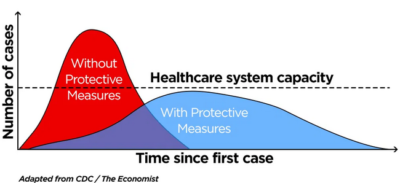 Ontario chose to flatten the curve. was that the best decision? And the place to start would be our pandemic target, which was never zero transmission, let alone zero infection. Our pandemic policy is primarily focused on flattening the curve. We are willing to accommodates some level of the virus transmission providing the death rate isn’t too high and hospitals aren’t too full. That means that we will continue to experience these on-again and off-again quasi-lockdowns until, we all hope, the vaccine can give us ‘herd immunity’ so that the virus will disappear.
The problem is that hundreds of thousands more Canadians may get the infection in the interim; an unknown number will be afflicted with long term after effects; and hundreds, if not thousands, more will die. And the danger of hosting all of that virus in our community is that it might mutate to a more deadly form, as the 1918 Spanish Flu did, and possibly negate the effectiveness of our vaccines.
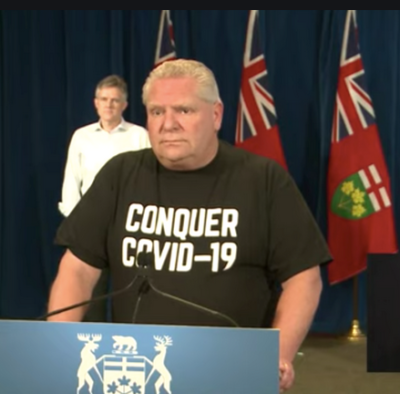 This is not a happy man. A glance at any Canadian newspaper will tell you how badly our provincial leaders and their chief medical people have failed us. Still they are not prepared to tolerate criticism, regardless how constructive. Alberta’s Kenny, with the worst infection rate in the country, and COVID soon to be the leading cause of death, calls it ‘Alberta bashing’, even when fellow Albertan’s complain. And Doug Ford labels his critics ‘arm chair quarterbacks’ even though they include some of the real-time front-line disease experts in the province.
Dr. Williams, Ontario’s chief medical officer, dispassionately admits an average of 25 deaths a day in this province, a number which will be increasing as the virus skyrockets from just below 2000 per day to as many as 5000 per day. Hospitals and their ICUs are nearing capacity and surgeries are already being postponed. And Christmas has been effectively cancelled in the province. By any measure of public health this is a disaster.
As we get ready to roll up our sleeves here for a vaccine, which may not even last till the end of the pandemic, we find that New Zealand is in no hurry to vaccinate its population – they don’t need to.
From the beginning of the pandemic that country has lost 25 people to COVID, that is how many people die every day here in Ontario. Between now and Christmas there will be almost 200 fewer of us to see the holiday in this year.
For some bizarre reason Mr. Ford has been able to maintain his popularity despite such a miserable record. Though there won’t be much to celebrate for the rest of us this year, even as Zoom let’s us virtually speak to the family who won’t really be with us. And for the most vulnerable and/or those living alone this will be the worst Christmas ever. Hey, the truth is we’re all to blame for letting this outbreak get so bad, but Mr. Ford is supposed to be guiding us – he says he is there for all of us.
For now it is a soft lockdown for Burlington – the purgatory of the red zone, replete with its dozens of rules which seem to get changed every day as if just to confuse us. But still it’s too little and way too late. Somebody was sleeping at the switch again before this train of disease really got rolling. Now, what a mess! It’s little wonder that Ford is too embarrassed to even attend his daily COVID briefings anymore. Besides, how does one say Merry Christmas after stealing it from you?
 Ray Rivers writes regularly on both federal and provincial politics, applying his more than 25 years as a federal bureaucrat to his thinking. Rivers was once a candidate for provincial office in Burlington. He was the founder of the Burlington citizen committee on sustainability at a time when climate warming was a hotly debated subject. Ray has a post graduate degree in economics that he earned at the University of Ottawa. Tweet @rayzrivers Ray Rivers writes regularly on both federal and provincial politics, applying his more than 25 years as a federal bureaucrat to his thinking. Rivers was once a candidate for provincial office in Burlington. He was the founder of the Burlington citizen committee on sustainability at a time when climate warming was a hotly debated subject. Ray has a post graduate degree in economics that he earned at the University of Ottawa. Tweet @rayzrivers
Background links:
Opening Up Too Soon – New Zealand – Kenny Alberta Bashing –
Ontario Lockdowns – Ontario Deaths –

 By Staff By Staff
December 13, 2020
BURLINGTON, ON
Those that got the message and were aware – came out in small groups.
 Families gathered on the streets with the older ones running alongside to keep up. The traffic on Twitter was heavy – so the word was being passed around.
Santa was in town – making visits to different parts of the city.
Kudos to the Parka and Recreation people for making this happen.
Use of face masks was spotty.
But people did have fun.
If a picture is worth a thousand words – here is several thousand.
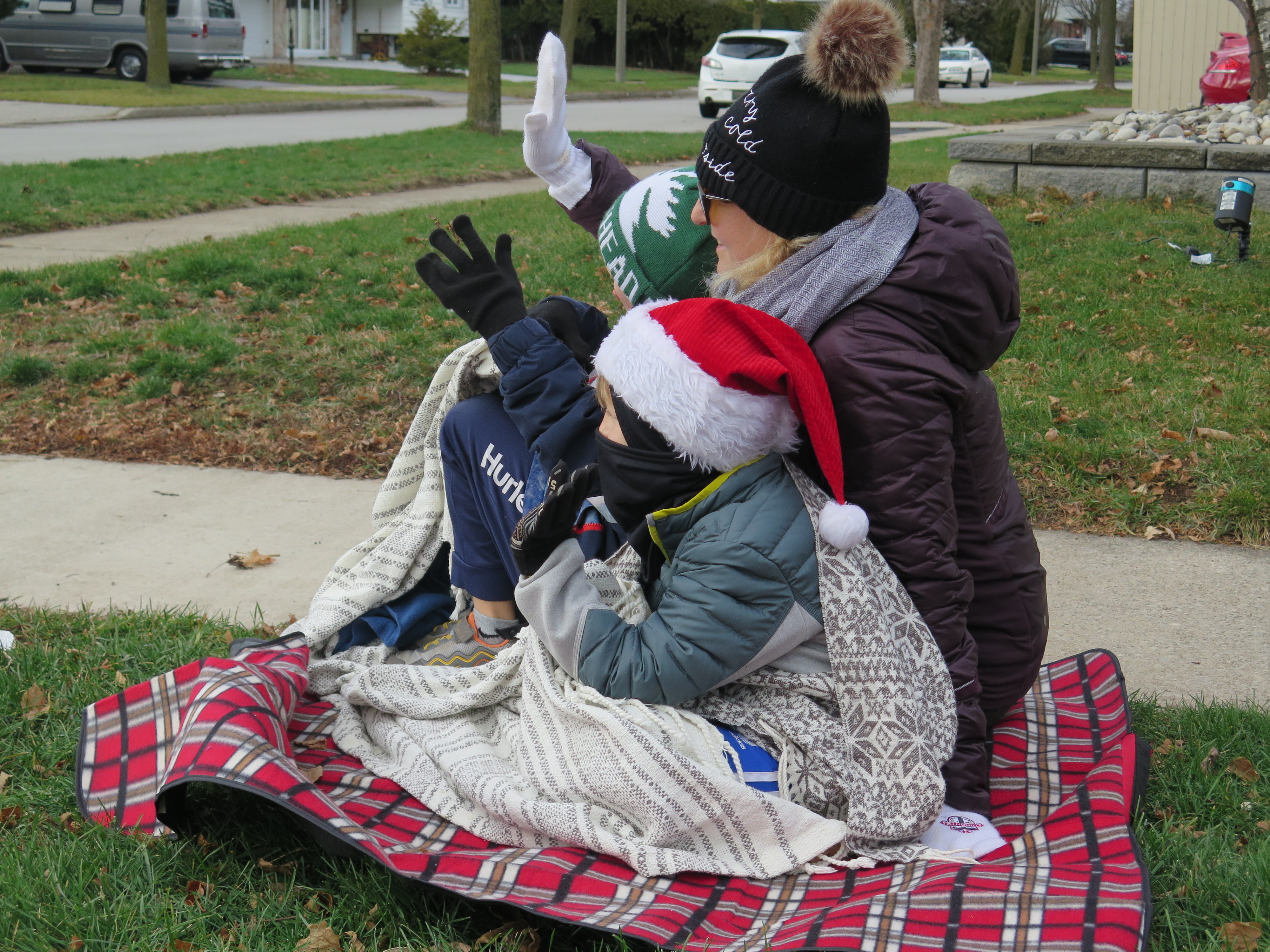 A little warmer and it could have been a picnic. 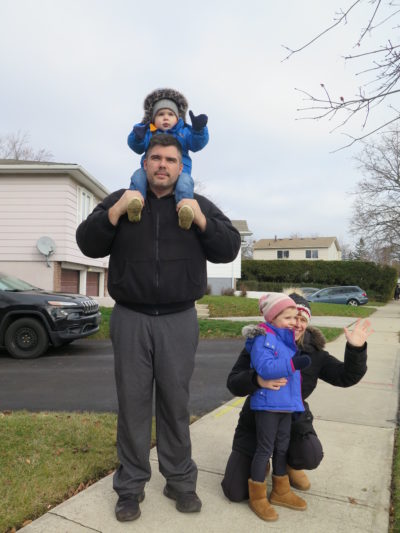 That child had the best view on the street.  Santa had quite a welcoming crew on this street.
 The old Ho Ho man himself  The snow man waves to Santa as he passes by. 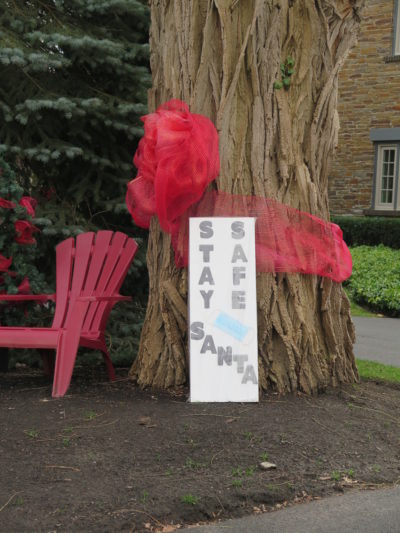 The message that was there for everyone to read – Stay Safe – Follow the rules. Photography was done by Denis Gibbons who recently wrote a piece on how he thought the Canadian teams in the National Hockey League should be organized for the next season
Worth reading.
Gibbons on bringing the game back home.

 By DENIS GIBBONS By DENIS GIBBONS
December 11, 2020
BURLINGTON, ON
Nothing good occurs during a pandemic, yet some of its side effects could bring positive changes.
The NHL, for instance, has decided to create an all-Canadian division for the 2020-21 season so that players do not have to cross the U.S. border, potentially leading to a spread of the COVID-19 virus.
The Calgary Flames, Edmonton Oilers, Montreal Canadiens, Ottawa Senators, Toronto Maple Leafs, Vancouver Canucks and Winnipeg Jets will play only in their own group.
 I’m suggesting they take things a step further and award the Stanley Cup to the champion of the Canadian division. I’m suggesting they take things a step further and award the Stanley Cup to the champion of the Canadian division.
Only the goals scored by Canadian players should count, except those scored against Canadian goalies, which would not!
However, the goalies who surrendered those goals would issue a coupon entitling the shooter to one free penalty shot.
That shot, if successful, would count as a goal.
Canadian networks, alone, should have the rights to telecast the games. And to steal a page, in reverse, from Donald Trump’s notebook, commercials should promote just Canadian-made products.
Before the season starts in January, each of the seven Canadian clubs would be allowed to draft five Canadian-born players from the rosters of the other 24 American teams. In return, each American club losing a player would be compensated with their choice of either two Europeans or three Americans.
That is deemed to be fair market value, according to the results of the last two Olympics and last two World Cups of Hockey, all of which have been won by Canada.
The champagne, traditionally sipped out of the Cup, would be replaced by Canadian Club whiskey, for those who imbibe. Tee-totallers could use maple syrup harvested from a Canadian bush.
Let’s make this a genuine Canuck Stanley Cup final by having the final series played in Ottawa, the nation’s capital, where the Ottawa Silver Seven defeated the Dawson City Nuggets to win Lord Stanley’s mug in 1905.
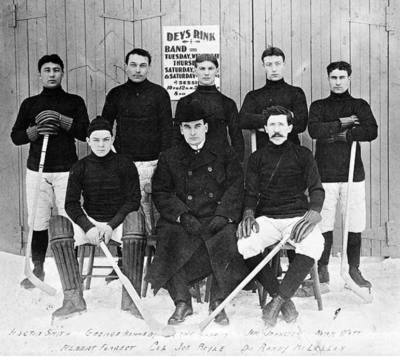  Much has been written about the 1905 Stanley Cup Challenge when the Silver Seven played host to the Nuggets, a team with no league that traveled 4,000 miles from the Yukon by dogsled, ship and train to compete for the Cup. Much has been written about the 1905 Stanley Cup Challenge when the Silver Seven played host to the Nuggets, a team with no league that traveled 4,000 miles from the Yukon by dogsled, ship and train to compete for the Cup.
It took them a month and, naturally, exhausted, they suffered humiliating losses by scores of 9-2 and 23-2. One-eyed Frank McGee, who lost the use of his left eye during an amateur game for a local Canadian Pacific Railway team scored 14 goals for Ottawa in the second game.
Sadly, McGee was killed fighting during the First World War in France. He was among the original inductees of the Hockey Hall of Fame in 1945.
Since the Dey’s Rink, which hosted the 1905 games, no longer exists, I recommend the series be played in the ornate Aberdeen Pavilion, the steel and glass structure at Lansdowne Park that was the site of the 1904 Stanley Cup challenge, also won by the Ottawa Silver Seven.
The pavilion was designated a national historic site because it is the only large-scale exhibition building in Canada surviving from the 19th century.
There are plenty of good reasons to exclude American teams from competing for the Stanley Cup.
When the Cup first was awarded to the Montreal Hockey Club in 1893, it was designated for Canadian amateur teams only. That was 24 years before the NHL even began.
Professional clubs did not become eligible to compete for the Cup, which was donated by Canada’s Governor General at the time, Lord Stanley of Preston, until 1906.
Besides Lord Stanley, who was born in England, authorized the construction of an outdoor rink on the grounds of Rideau Hall and was a benefactor of the Ottawa Hockey Club.
Two of his sons, Arthur and Algernon, were teammates of James Creighton on the Rideau Rebels team.
It was Creighton who organized the first official indoor game of hockey at the Victoria Skating Rink in Montreal in 1875.
Lord Stanley’s daughter, Isobel, participated in the first recorded women’s ice hockey match, which took place on the Rideau rink on February 10, 1891.
This old blusterball welcomes the comments of all readers of The Burlington Gazette.
Denis Gibbons, a former editor of the Burlington Post has written frequently about hockey at both a local and international level. He learned to speak Russian at McMaster University and served as a translator during several of the international contest.
Related news story:
He was once an alter boy

 By Pepper Parr By Pepper Parr
December 9th, 2020
BURLINGTON, ON
In a couple of weeks the kids will be coming home for the holidays.
I know of at least one student who expects to be on the plane on the 21st arriving from the Maritimes where the virus spread has been pretty limited relative to the rest of the country.
Her brother will be coming home from an Ontario university west of Burlington.
 Given the rules these students will be required to self-isolate for 14 days. Count them – December 21st + 14 days gets them to January 2nd or third. Given the rules these students will be required to self-isolate for 14 days. Count them – December 21st + 14 days gets them to January 2nd or third.
What are the chances of that actually happening ? These are decent people in the process of becoming adults.
They come from good families with parents who are going to want them to do the right thing.
Checking in with friends, getting together for coffee because there is nowhere they are able to scoot off to for a drink is what you do when you are home from school.
This kind of getting caught up doesn’t get done on the telephone but it does get done.
Expecting the rules to be rigidly adhered to is a huge stretch; the outcome will be a rises in the number of infections both in every town in the province and in the communities to which these students return.
Something to think about.
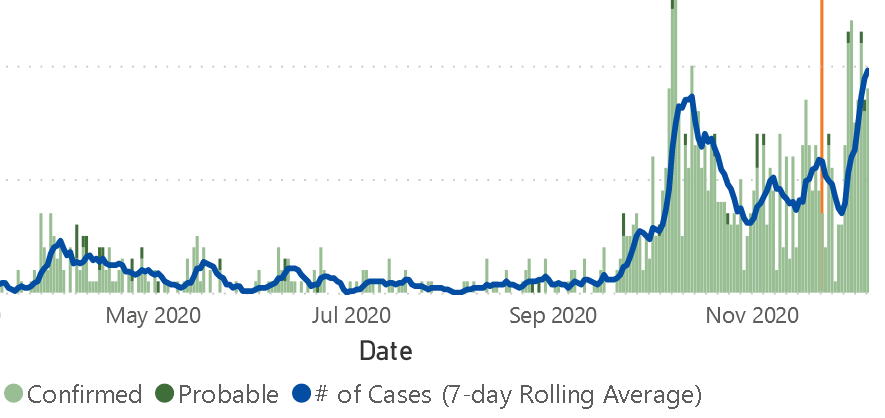 How much higher will that blue line go once the students return to the universities and colleges? Salt with Pepper is the musings, reflections and opinions of the publisher of the Burlington Gazette, an online newspaper that was formed in 2010 and is a member of the National Newsmedia Council.

 By Mildred Austria By Mildred Austria
December 2, 2020
BURLINGTON, ON
What industries are some of the most profitable in 2020, and how are they achieving this? We took a closer look at three here!
The world of business is filled with so many interesting sectors nowadays, but there are still some that stand heads and shoulders above the rest. Let’s take a look at some of the most profitable industries operating this year.
 Any of the three successful business choices we outline will put cash in that jar on the right.
Gaming
Without a doubt, gaming is proving to be one of the biggest industries of the moment. Brands like Mr Green as a prime example are leading the expansion of safe betting and casino options across the USA and Canada. What’s more, there has been a massive boom in e-sports growth.
It is slowly moving from being a niche hobby into a more mainstream business. With that will come bigger sponsorships and more opportunities for people in the industry. The marketplace has so far exceeded $1 billion and this is just set to get bigger. Top matches are also pulling in figures akin to major sports events like a FIFA World Cup Final.
 Play Station 5 Even in the wider industry there are massive strides forward being made. Sony is lining up to release the PlayStation 5. Though we currently have little idea about when this release will be, it will hopefully be as innovative a release as its previous incarnations. Gaming as a whole is on the rise. Though many dismiss it as “just playing games”, this then leads to them missing out on some of the incredible opportunities available in this exciting development in the gaming universe.
Software Development
As we move towards a world that becomes more and more reliant on technology, we are going to need more software developers to help us achieve our goals. There have been many moves to introduce coding and other digital-based skills to young children in the classroom, so they can begin to pick up things that might help them when they are ready to enter the workplace later in life.
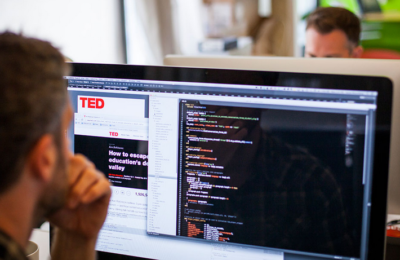 Software coding skills are going to be in very high demand in the decade ahead. Not only have there been calls for software that covers a variety of new tasks within a workplace or home, but there have also been calls to make many more multi-purpose software hubs. Business owners don’t want to transfer data between multiple programs to get the results they need. They want to be able to plug everything into the one portal, so that they can get back results that have already been parsed and analysed into a format they understand. Software developers are keen to meet these demands, and it makes for an incredibly profitable industry.
Property
With property prices holding or moving up, there is no better time to be involved in the real-estate business. In the Burlington area alone, sale prices are up 17% compared to the beginning of 2019. There are lots of opportunities at both ends of the market here. Developers who want to focus on the high-end, luxury market will find plenty of things to play with. There are always new property trends and new tech that you can introduce to the right property.
At the other end of the scale, you could choose to work in the affordable housing markets. There is and always will be a need for affordable property. This sector will help to create homes and houses for those who need them the most. Choosing to get involved with this area of the real estate sector is incredibly charitable, and it could result in some brilliant business dealings for anyone brave enough to try.
These are just three of the many industries proving to be profitable in 2020. No matter where you look, there is a way to make money in a sector. It will take a lot of hard work, and a great business idea, but it is more than possible.
Start thinking about a business you could launch in one of the above sectors now.
Ms Austria is a financial observer who has established a reputation for being able to spot growth trends in the Western world.

 By Pepper Parr By Pepper Parr
December 2, 2020
BURLINGTON, ON
OPINION
I got the notice and if you are a Netflix subscriber, I assume you got one as well.
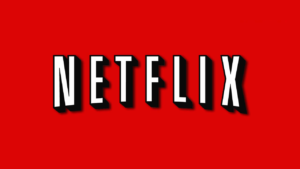 Just what did it mean? They were telling us that they have created a new corporate structure to deal with their Canadian clients. Would that be a defensive move to protect them from the Canadian tax system. Just what did it mean? They were telling us that they have created a new corporate structure to deal with their Canadian clients. Would that be a defensive move to protect them from the Canadian tax system.
That’s my take – what do you think?
Here is what the Netflix notice said:
We wanted to let you know about some updates to Netflix. These won’t affect your experience—continue watching your shows and movies as usual.
On January 1, 2021, your Netflix contracting company will change to Netflix, Inc.. This update will be made automatically, with no interruption to your current membership.
We periodically update our legal terms. Please take a moment to read the current Terms of Use and Privacy Statement.
The notice raised my eyebrows but perhaps that is just my core suspicion showing.
Salt with Pepper is the musings, reflections and opinions of the publisher of the Burlington Gazette, an online newspaper that was formed in 2010 and is a member of the National Newsmedia Council.

 By Pepper Parr By Pepper Parr
November 30th, 2020
BURLINGTON, ON
OPINION
There are seven LCBO stores in Burlington.
An application for the 17th cannabis retail location has been received; 10 of the applications are operational, five are under review, two, plus the most recent, are out for community comment.
Municipalities were given the option to permit the setting up of retail cannabis stores or to take a pass and not permit cannabis retail locations.
Burlington chose to permit them: it was a 5-2 vote permitting, with Councillors Stolte and Bentivegna against.
The Mayor was a very strong supporter, at times sounding like an advocate.
The other four were inclined to go along.
The Town of Oakville decided not to permit cannabis stores.
Many take the view that the commercial locations will fail if there isn’t a customer base creating a demand.
There is certainly a demand for the product – but it isn’t from the people of Burlington. The folks from Oakville drive over to patronize the Burlington locations.
I am not opposed to the sale of the product – it’s legal – let people buy it. My concern is why does Burlington have to become the destination for people in communities that don’t have cannabis shops where they live?
We keep hearing the argument that there are those who need the product for medicinal purposes.
Is this what the people of Burlington believe reflects the values of their community?
Is there a point the city might not want to go beyond?
And can city council do anything to perhaps cap the number of locations?
We think it is a question that can and should be asked of City Council.
Are we at that enough is enough point?
Related news story:
Application for 17th cannabis store received by the provincial government.
Salt with Pepper is the musings, reflections and opinions of the publisher of the Burlington Gazette, an online newspaper that was formed in 2010 and is a member of the National Newsmedia Council.

 By Pepper Parr By Pepper Parr
November 28th, 2020
BURLINGTON, ON
It isn’t the best of news.
Two COVID-19 outbreaks at the Joseph Brant hospital.
Climbing numbers within the city and additional deaths.
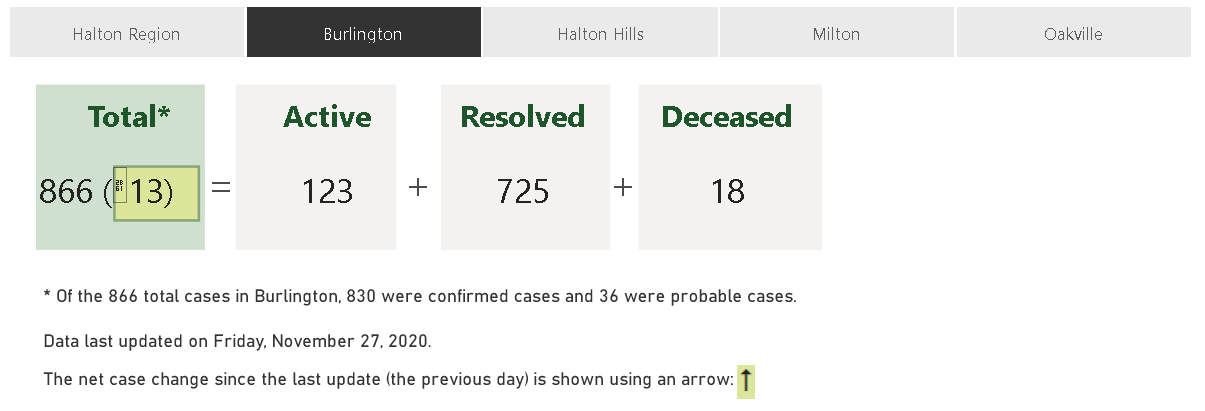 Data at the close of November 27th. Shops, supermarkets and hardware stores are pretty busy. I really wish the supermarket I go to would limit the number of people allowed in the store at the same time. Yes it slows things down but it keeps everyone safer.
The future availability of a vaccine doesn’t look all that promising. The predictions are that in Canada we will not see the bulk of the population completely vaccinated until December of 2021.
You can bet that the politicians at the federal and provincial levels will be deemed to be front line workers. The people working in the hospitals have to be first.
Can we keep on going the way we have had to for another full year? There are some that can’t keep away from their favourite watering hole for more than a couple of weeks.
Canada doesn’t appear to have the manufacturing capacity to make the stuff and bottle it.
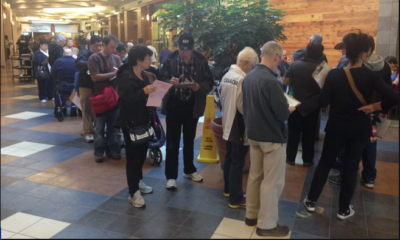 We had long line-ups for the annual flu shot. It will be much different with the vaccine is available. We have manufacturing capacity for run of the mill annual flu shots – the vaccine for COVID-19 is a much more complex product requiring equipment we just don’t have.
Worrying for sure.
While going through the Saturday papers I read that the word “precarious” was used by Dr. David Williams to describe the situation we are in – not very reassuring.
And have you noticed that the top people at the federal level are beginning to equivocate somewhat ? Where are they when you really need them?
Salt with Pepper is the musings, reflections and opinions of the publisher of the Burlington Gazette, an online newspaper that was formed in 2010 and is a member of the National Newsmedia Council.

 By Pepper Parr By Pepper Parr
November 24th, 2020
BURLINGTON, ON
OPINION
We received a comment recently from a reader that is very disturbing.
We have chosen not to identify the woman but can verify that she is very credible.
Here is what she had to say:
“I had an appointment last week at a nearby medical center. When I arrived, I was told to call the number posted on the door and wait in my car until someone came to find me.
“Once I was escorted inside, my mask was checked, my temperature was taken and I was led to the doctor’s office. In contrast today, I went to Joseph Brant for a scheduled procedure.
“Entering through the north doors, I found people wandering in and out randomly. The question check was quick, no instructions were given as far as hand sanitizer and I was left to wander the hallways to find the location of the unit I was to visit.
“In my opinion, the hospital must do a better job of screening those who are required to visit this facility in these difficult times.”
The Joseph Brant Hospital has a regrettable history of sloppy prevention practices. We thought the lesson had been learned. Time for the hospital Board members to ask some hard and direct questions, and for the Medical Officer of health to visit and underline what this pandemic requires of the medical community.
Salt with Pepper is the musings, reflections and opinions of the publisher of the Burlington Gazette, an online newspaper that was formed in 2010 and is a member of the National Newsmedia Council.

 By Ray Rivers By Ray Rivers
November 18th, 2020
BURLINGTON, ON
OPINION
Will we soon be known as the peacock province? A province of many colours, political ones that is.
Rumour is that there may be a new provincial party on the horizon, the Blue party. And why not? There is already a Green Party, Liberals have always been identified as reds and the NDP orange.
So what does this mean for the governing Doug Ford provincial Tories? They are supposed to be the blue party, claiming to be descendants from the former premier Bill Davis’ Big Blue Machine. Heck Mr. Ford even started turning our licence plates blue.
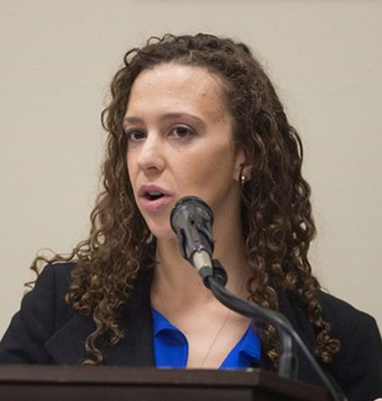 Cambridge MPP Belinda Karahalio But Cambridge MPP Belinda Karahalios doesn’t think Ford’s crowd is blue enough. She was kicked out of Doug Ford’s caucus last July for refusing to support his Bill 195, the so-called emergency law on COVID. She knew this so-called emergency legislation was just a power grab by Ford so he could ram his retro agenda down our throats.
Being able to act without challenge is every tyrant’s dream. Not that I’d call our PM a tyrant, but Mr. Trudeau tried something similar in Ottawa, only to be stopped by an observant media and an wide-awake opposition party. Not so in Toronto. An Act to enact the Reopening Ontario (A Flexible Re-sponse to COVID-19) Act, 2020 allows the government of Premier Doug Ford to extend or amend emergency orders a month at a time for up to two years without consulting the legislature.
For Karahalios this was an “unnecessary overreach” taking away “the legislature’s ability to vote on the use of extraordinary emergency powers on Ontarians for the next year… Bill 195 essentially silences every single Ontario MPP on the most important issue facing our legislature today”.
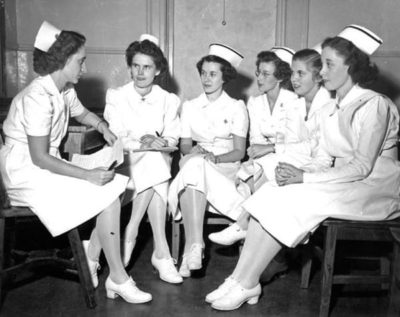 A government that attempt to stiff nurses usually regrets the decision. The Nurses Association (ONA) and other labour organizations are upset to say the least. The premier has given himself the power to override existing labour legislation and collective agreements. It is no secret that Mr. Ford regards organized labour as the enemy, but antagonizing Ontario’s front line work-ers in this time of the COVID epidemic is totally uncalled for. One might think that America’s Mr. Trump had shifted his residence into the premier’s office at Queen’s Park.
Well except that Karahlios doesn’t think Ford is far enough to the right. She thinks he’s not blue enough to represent real conservative-minded voters like her – claiming Ford has moved to the political left and is now in common territory with the other main Ontario parties. So one has to wonder what it takes to make one a real conservative.
Was it the deficit? Conservatives have long opposed budgetary deficits, except when they get into office, as was the case with former PM Mulroney. And even Mr. Harper ran record deficits during 2009-2011 period in an effort to stimulate a recessionary economy. So would it be fair to attack Mr. Ford’s record setting COVID deficit and use that to boot him out of the conservative club.
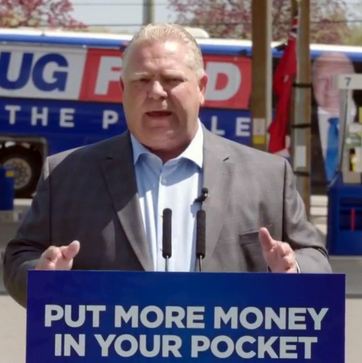 The issue for Doug Ford has always been money. And surely Ford qualifies when it comes to tax cuts for the wealthiest, perhaps the most common of currencies among conservatives. His carefully camouflaged middle income tax cuts have turned out to be a Trojan horse, as predicted, and a bonanza for the wealthiest. The provincial Financial Accountability Office (FAO) has calculated that Doug Ford’s tax breaks are benefiting Ontario’s highest earners. “The top 20 per cent, with incomes over $123,400, are getting 43 per cent of tax benefits, including 75 per cent of deductions, which adds up to over $7 billion every year.”
When it comes to the environment the ultra conservative former PM, Mr. Harper, pulled Canada out of the international Kyoto agreement on climate change and pursued a fossil fuel agenda as Conservative PM. If that is real conservatism then Mr. Ford certainly qualifies as well, having mothballed almost all of Ontario’s emission reduction programs including renewable energy projects. Further he has sued the federal government over imposition of the national carbon tax.
And now the second shoe is dropping as he moves to further please the land development and other business lobbies who seem to have captured his attention. Ford’s most recent retro-legislative initiative, Bill 229, attacks the historical role of conservation authorities in land use planning, one of their primary purposes since their establishment back in 1946, by then PC Premier George Drew. What could be more conservative than conservation?
So it’s uncertain just where and how far Karahalios would like to see Mr. Ford go to prove he is a real conservative? He is already on a clear path to eliminate everything represented by the word progressive in Progressive Conservative. Ford has turned the clock back three or four decades in many regards and especially the environment. And that will create a headache for the next government which will have to clean up the mess.
Perhaps there is more to this story? After all it is no secret that Belinda’s husband, Jim Karahalios, a long time deep Tory, had tried on more than one occasion to become a party president for either/both the federal and provincial parties, only to be foiled by some kind of alleged intra-party conspiracy. It’s easy to see how that can make one bitter and twisted.
In fact he sued the federal party at one point and won. And of course, there is no better way to win friends and influence people than with a law suit. So perhaps this plan to hatch a new Blue party is a case of sour grapes, or even revenge to draw right wing voters away from Mr. Ford’s party. Splitting the right even more beyond the Heritage, Libertarian, Family Coalition fringe party platforms might be a more serious threat.
And unlike these two bit political efforts, the Blue’s would have a seat in the house (Cambridge) at least until the next election. And Jim, who was the creative genius behind ‘Axe the Tax’ anti-carbon tax campaign, presumably is qualified in Belinda’s mind and has the chops to help her lead her new Blue party.
It could happen. After all, Preston Manning’s Reform Party grew almost overnight to become Her Maj-esty’s Loyal Opposition after a lot of conservatives felt Kim Campbell wasn’t quite blue enough for them. It was an act of courage to stand apart from the familiar crowd of mindless desk-thumping seals at Queens Park and speak up when something stinks. And on that note she deserves a vote of appreciation.
 Ray Rivers writes regularly on both federal and provincial politics, applying his more than 25 years as a federal bureaucrat to his thinking. Rivers was once a candidate for provincial office in Burlington. He was the founder of the Burlington citizen committee on sustainability at a time when climate warming was a hotly debated subject. Ray has a post graduate degree in economics that he earned at the University of Ottawa. Tweet @rayzrivers Ray Rivers writes regularly on both federal and provincial politics, applying his more than 25 years as a federal bureaucrat to his thinking. Rivers was once a candidate for provincial office in Burlington. He was the founder of the Burlington citizen committee on sustainability at a time when climate warming was a hotly debated subject. Ray has a post graduate degree in economics that he earned at the University of Ottawa. Tweet @rayzrivers
Background links
Blue Party – Nurses Association – FAO – Bill 229 –

 By Pepper Parr By Pepper Parr
November 16th, 2020
BURLINGTON, ON
OPINION
On a CBC radio program earlier today Melissa Lastman, a strategist with Enterprise Canada said: She added later that many people feel “Nobody is telling us why”.
We are getting a lot in the way of numbers – nothing comforting in any of them.
1487 new cases in Ontario
538 for Toronto
88 active cases in Halton – 16 deaths in the Region.
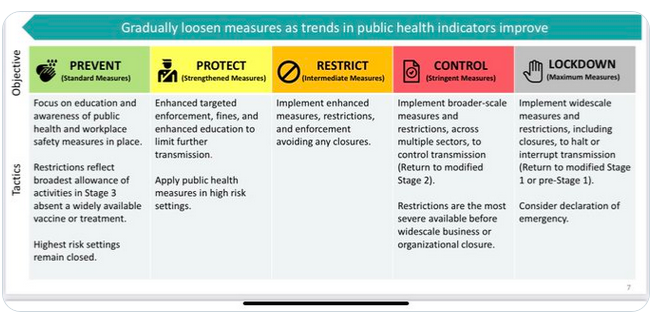 And we are now in a “red” code which the Mayor seems to be comfortable with as she struggles to breath some life into the hospitality sector. And we are now in a “red” code which the Mayor seems to be comfortable with as she struggles to breath some life into the hospitality sector.
She is pushing a big stone up a hill.
The virus is in the community – that is a fact. How far it gets to go is up to us.
We have a Premier who is loath to shut things down – it isn’t in the way he thinks or acts. He is a business person – the doors don’t get closed.
At a Standing Committee Council was focused on getting a little closer to normal and beginning to open up a little. There were some really good ideas and the mood of council was upbeat.
Then the move into a Red Control Zone. Council and Staff didn’t seem to be fully aware of just what the numbers were really telling us.
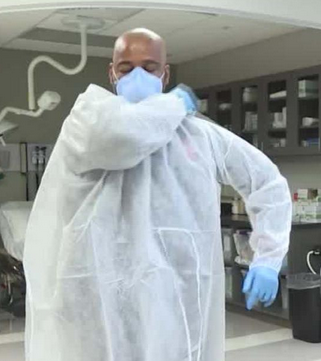 The province today announced significant changes in the way PPE is sourced. There is a bigger picture and a bigger responsibility that no one seems to fully understand or prepared to do all that much about.
At Council next week they will decide if the second round of $125,000 funding for PPE is to go forward.
There is now a very vigorous debate within the medical community. The province appears to be prepared with new infections just as long as there aren’t too many.
There is a new group of medical professionals who urge that a 0 growth rate be put in place and that we shut down as much as possible until that level is reached.
We need to do more to get this virus under control is the sentiment that is being heard.
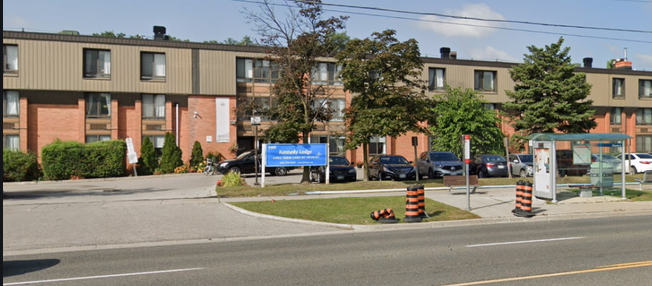 A reported 29 deaths at this Long Term Care residence No one at the political level is prepared to say that Christmas will be different – just how much is the big question.
The Canadian Medical Association has said that “we are very close to a tipping point”. This is a voice that needs to be heard.
Something that has to be said as well: We should be ashamed of what we have let happen in the long term care homes.
There is a report of one home in which 80% of the residents are infected.

 By Andrew Drummond By Andrew Drummond
November 15th, 2020
BURLINGTON, ON
On Nov 13, the Ford government announced that Halton region will be added to the list of regions in the “red” zone, effective Nov 16. After a Toronto Star story exposed that the government ignored health experts’ recommendations and amplified the requirements for inclusion to red restrictions by 4x, they announced a new set of guidelines that will include Halton into the most restrictive conditions that currently exist in Ontario.
Unfortunately, even these restrictions are too little to seriously impact the spread of COVID-19 within our community given the explosive increase in cases and positivity ratings during the last month. The best course of action would be for the government to fund a complete two week shut down of all non-essential businesses so that Halton and other communities have a chance to fight the spread of COVID-19. Without decisive action now, we will be forced into a second, lengthy lockdown that will threaten the economic recovery that our region has worked so hard to build.
 Regional Public Health data for November 11th Over the week of Nov 5-11 Halton region had a rate of 54.9 confirmed COVID-19 cases per 100,000 residents. The Region also has a positivity rate of 4.4%. These are alarming stats, and indicators that the current efforts in the Region are not sufficient to contain the spread of the virus. There is reason for concern however that the new measures to be implemented on Nov 16 will also be insufficient in stopping the spread. As an example, Peel region is currently under even more restrictive measures than what the “red” zone mandates and yet has seen its cases increase exponentially. People are fatigued with social gathering restrictions and will only follow guidelines if stringently enforced, not if they are merely recommendations.
Controlling the spread of COVID is essential to the health of our community. Beyond spread within the Burlington community, there is also a localized outbreak at Tansley Woods Retirement Home. To date 35 residents and 11 staff members have been infected with the virus. As of Nov 13, 7 of these residents have died. This is too terrible an impact within our community to ignore. Without quickly imposed strong measures in place, we risk further institutional outbreaks that will endanger our most vulnerable populations.
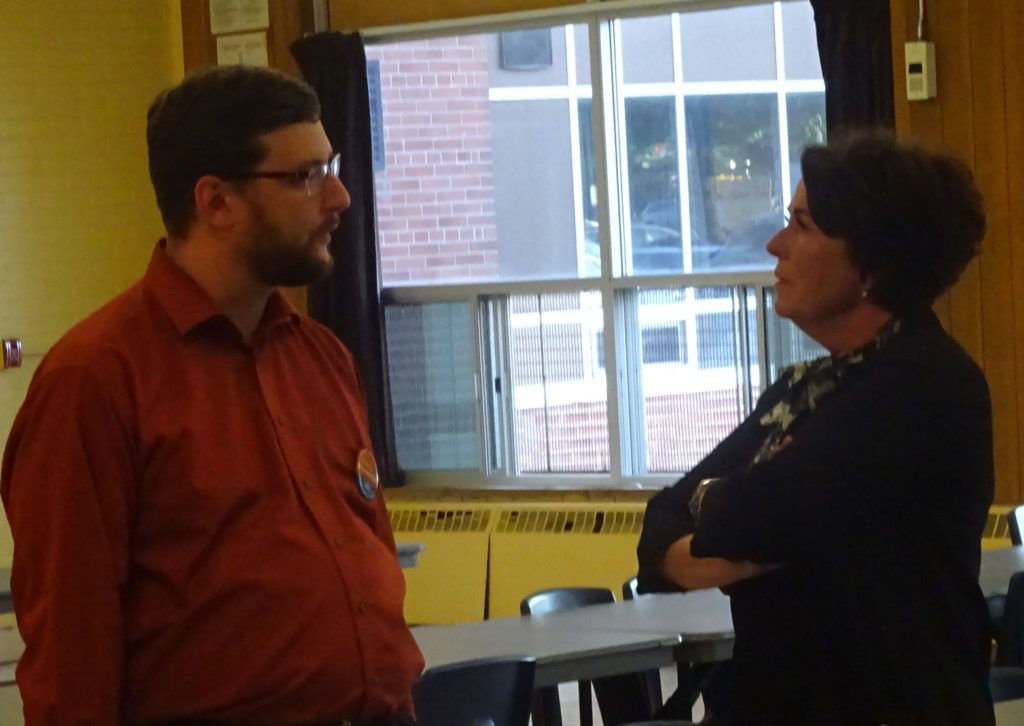 Andrew Drummond talking to Jane McKenna at an all candidates meeting during the last provincial election. On October 24, Burlington MPP Jane McKenna co-authored a public letter to Ontario’s Chief Medical Officer of Health referring to the minimal restrictions in place at that time. “These measures are working.” she said. This was completely untrue. We now know that holding back on necessary restrictions then allowed the virus to spread virtually unchecked within our community. It is critical that those mistakes not be repeated again. We need a stronger set of restrictions with rigid enforcement or we risk our region suffering the same fate as Peel with more than 400 cases every day.
The COVID pandemic has to date caused a massive amount of damage to the Burlington economy. Countless small and medium businesses in Burlington have struggled. Many have closed and many more have been forced to move. And throughout, there has been very little support from the provincial government. The federal government has offered a significant amount of support towards businesses and employees affected by the economic downturn. But the province has been hesitant to provide even meager additional supports. That has to end.
According to the Ontario government, 97% of direct support for COVID impacted people and businesses has come from the federal government with only 3% coming from Ontario itself (https://www.fao-on.org/en/Blog/Publications/fed-prov-response-2020). Ontario needs to step up and have a plan for the long term health of our economy. Preventing shutdowns now risking future COVID outbreaks is short-sighted. We need the government to actually support our businesses through the short term so they can rebound through what is to come.
Burlington, Halton, and Ontario need to beat this wave of COVID-19. Our community cannot afford another week or month of the indecisive wait and see approach from our leaders. But our small and medium businesses cannot afford to take this hit by themselves. The Ontario government must finally step up and give our business community the support that it needs to shut down in a controlled manner, before we are forced to do so in a panic.
 Burlington is currently in the red zone – Control The current measures do not go far enough. It is a continuation of the conflicting direction and expectation that most people will take additional measures on their own initiative. That is not good enough, we need better. Even the “red” zone guidelines are conflicting in their expectations. The strong recommendation is that no one leave their homes except for essential travel (work, school, etc.). However, there are guidelines set as to how house league sports are to conduct themselves (no games, practices only). Is house league sports really an essential activity worth risking our community’s health?
Why have guidelines for it if everyone is supposed to stay home except for essentials? Mall food courts are restricted to 10 seated guests. The food court at Mapleview almost certainly has to close under those restrictions. So where is the support for those businesses? Every recommendation from the government in the last three months has been politicized and constantly modified to the point that neither citizens nor businesses are sure what the exact advice is anymore.
These conflicts are only examples of the conflicted, unclear, and indecisive leadership shown by the government during this crisis. They are so invested in protecting businesses in the immediate short term that they can’t or won’t plan for what is necessary in the medium term. Burlington needs a decisive shut down in order to protect our community and to ensure that all of our efforts in the past six months were not in vain. Burlington has worked too hard for too long to suffer through more indecision and half measures. The time is now for decisive action to ensure that our community has a chance to build the recovery we need.
Andrew Drummond is a Burlington resident. He was the NDP candidate during the last provincial election.

 By Pepper Parr By Pepper Parr
November 14th, 2020
BURLINGTON, ON
OPINION
City Council has a cycle of meetings for each month.
They hold Standing Committee meetings at which there is usually vigorous debate on Staff Reports.
Then a Council meeting at which the results of the debate get approved (or not approved) which results in a bylaw that governs what we can and can’t do.
 While supported by good staff – these are the brains and executive capacity that keep the Emergency Coordinating Group ahead of major problems. We are currently in a mode of government where the real power is in the hands of the Emergency Control Group. (Council is involved, heavily involved, but the ECG does have the power to call the shots.)
The Emergency Control Group was the result of a decision made by the province that required every municipality to create an emergency control group.
Each month Council gets a “Service Re-design” report in which the ECG sets out program changes and modifications.
On Thursday Council heard a report from the Parks and Recreation Department on the Community Winter 2021 Opportunities for Recreation Services.
In the Executive Summary of the report, Staff said “…there is still a degree of uncertainty regarding the spread of COVID-19…”.
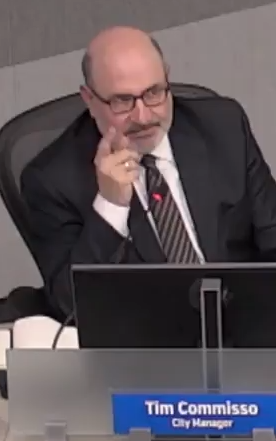 There was no comment from the City Manager on just what that “degree of uncertainty” was; there was mention of the costs involved in the proposals that were put forward. There was no comment from the City Manager on just what that “degree of uncertainty” was; there was mention of the costs involved in the proposals that were put forward.
There were ideas and proposals for Outdoor Skating, Holiday Skates, Holiday Activation, and Winter Activation all with numbers attached setting out what it would cost and require in the way of staffing resources.
The Parks and Recreation people were asked to get more solid numbers on the costs. I suspect the Parks and Recreation people were a little taken aback at just how keen council seemed to be with most of their ideas.
That was Thursday.
On Friday the Province had taken a harder look at the numbers and moved all of Halton into a Red Zone, effective Monday (why the delay?) with a clear threat for a tough lock down later in the week.
It seemed as if Burlington City Council and the senior city administration people and the provincial leadership were singing from different hymn books.
City Manager Tim Commisso has some very smart people working with him – he frequently refers to his lead person on just what the province is doing and keeping him up to date on what is coming out of the Regional Public Health office saying that he couldn’t do his job without that person.
So here we were with Burlington sailing ahead with what sounded like good plan for giving the public things to do – the Santa traveling about the city on a fire truck was particularly neat –an innovative way to make up for the cancellation of the Santa Claus parade.
I couldn’t reconcile what Burlington was setting out to do with what the Province did on Friday.
I decided to look at the Regional Public Health data – something I now wish I had done much earlier.
Gazette resources are limited and I just didn’t keep a close eye on the data.
It was a shocker – there is a link below to the piece we published earlier today on what we learned.
The rolling average for the Region is 50 new infections each day with a positivity rate of 5: that is not a sustainable number. The hospital cannot manage those levels.
The concern is this: Did the city manager not know about the Regional data? Was that information not passed along to him?
 No mention of the Regional Health data from this bunch on Thursday Did members of Council stop looking at the Regional data? Not one of them made any mention of what the Region was telling anyone who took the time to visit their site.
Don’t expect anyone to say much about the eyes being taken off the ball – but hopefully we can expect a different tone at the meeting of City Council on the 23rd.
We could be in a total lock down by then.
Related news story
Regional data
Salt with Pepper is the musings, reflections and opinions of the publisher of the Burlington Gazette, an online newspaper that was formed in 2010 and is a member of the National Newsmedia Council.

|
|
 By Pepper Parr
By Pepper Parr




















 Ray Rivers writes from time to time about whatever is on his mind. A former sheep farmer he has served as a federal bureaucrat for 25 years, ran for public office and lost. He was the founder of the first sustainability public interest group in Burlington.
Ray Rivers writes from time to time about whatever is on his mind. A former sheep farmer he has served as a federal bureaucrat for 25 years, ran for public office and lost. He was the founder of the first sustainability public interest group in Burlington.

















 I’m suggesting they take things a step further and award the Stanley Cup to the champion of the Canadian division.
I’m suggesting they take things a step further and award the Stanley Cup to the champion of the Canadian division.
 Much has been written about the 1905 Stanley Cup Challenge when the Silver Seven played host to the Nuggets, a team with no league that traveled 4,000 miles from the Yukon by dogsled, ship and train to compete for the Cup.
Much has been written about the 1905 Stanley Cup Challenge when the Silver Seven played host to the Nuggets, a team with no league that traveled 4,000 miles from the Yukon by dogsled, ship and train to compete for the Cup. Given the rules these students will be required to self-isolate for 14 days. Count them – December 21st + 14 days gets them to January 2nd or third.
Given the rules these students will be required to self-isolate for 14 days. Count them – December 21st + 14 days gets them to January 2nd or third.
 By Mildred Austria
By Mildred Austria


 Just what did it mean? They were telling us that they have created a new corporate structure to deal with their Canadian clients. Would that be a defensive move to protect them from the Canadian tax system.
Just what did it mean? They were telling us that they have created a new corporate structure to deal with their Canadian clients. Would that be a defensive move to protect them from the Canadian tax system.




 And we are now in a “red” code which the Mayor seems to be comfortable with as she struggles to breath some life into the hospitality sector.
And we are now in a “red” code which the Mayor seems to be comfortable with as she struggles to breath some life into the hospitality sector.




 There was no comment from the City Manager on just what that “degree of uncertainty” was; there was mention of the costs involved in the proposals that were put forward.
There was no comment from the City Manager on just what that “degree of uncertainty” was; there was mention of the costs involved in the proposals that were put forward.
